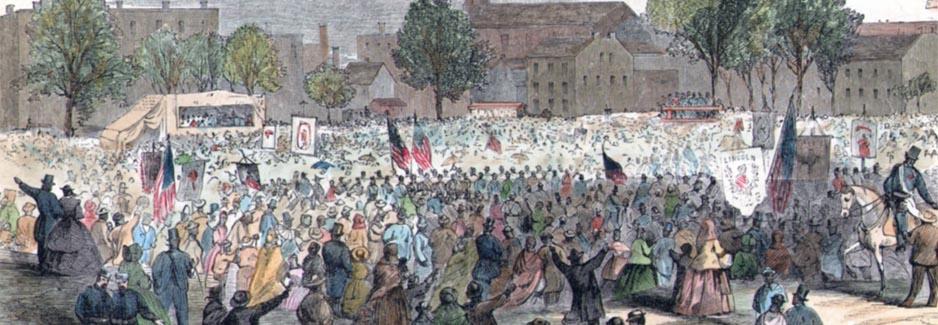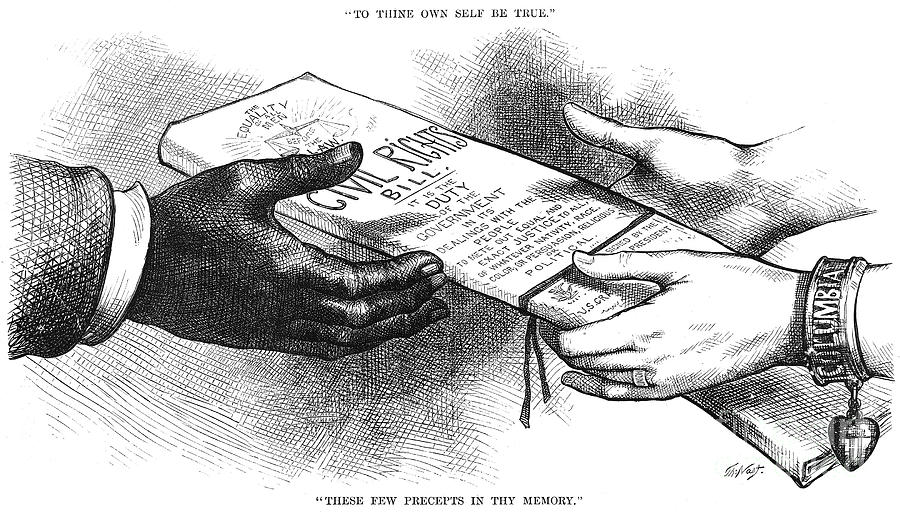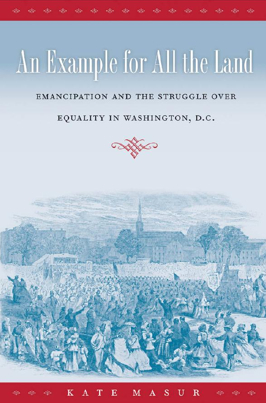
Emancipation Day Celebrations: Sketch of the celebration of the Abolition of Slavery in DC. (Moorland Spingarn Research Center)
From The New York Times, "Capital Injustice," by Kate Mansur, on 28 March 2011 -- On March 29, 1961, the states completed ratification of the 23rd Amendment, which gave residents of the District of Columbia the right to vote in presidential elections. The anniversary is worth remembering, both because the amendment was an important step toward full political equality for citizens of the nation’s capital and because it was frustratingly incomplete.
A half-century later, the District of Columbia’s population, estimated in the new census at 601,723, is larger than Wyoming’s and only slightly smaller than Vermont’s. Yet Washingtonians still have no meaningful voice in Congress and lack full authority over their own affairs.

Washington is an undemocratic anomaly, despite the grand ideals of equal rights carved into the city’s stone monuments. Its second-class citizenship is a legacy of racial injustice and, more recently, partisanship in Congress.
To preserve the capital’s independence from politics in the states, the nation’s founders provided in the Constitution for a federal district over which Congress would “exercise exclusive legislation.” Nonetheless, Congress soon chartered a city government. By 1848, all of the capital’s white male residents were entitled to vote for a mayor and city council.
Democracy continued to expand in the Civil War era. A Republican-led Congress ended slavery in the capital in 1862, and enfranchised black male residents in 1867.

Black men’s suffrage transformed the local government. With white voters split between the parties, black Washingtonians — who made up a third of the population and were almost entirely Republicans — had significant influence in electoral politics. Soon, the city government outlawed or restricted racial discrimination in public accommodations and public works hiring. Black men were elected to local office. Public schools were established for black children.
But as African-American political power increased, so did challenges to home rule from local whites. Long-time conservative Democrats and pro-business Republicans in the district combined to persuade Congress to diminish the power of the newly biracial electorate. The result was a territorial form of government for the capital in which presidential appointees held the most powerful offices. It was only a few steps from there to complete disfranchisement. In 1874, at the behest of conservative businessmen, Congress again reorganized the government, this time placing three presidentially appointed commissioners at its helm. Supporters argued that the change was essential for efficient government; opponents called the end of local self-government un-American.
Washingtonians still had no vote as the capital became the nation’s first majority-black large city in the late 1950s. As national civil rights leaders pressured Congress to eliminate the country’s most glaring breaches of democracy, Washington activists pushed for representation in Congress and the return of home rule.
Five times from 1949 to 1960, the Senate passed home rule bills. Each time, the bills died in the House Committee on the District of Columbia, led imperiously for nearly three decades by John L. McMillan, a segregationist Democrat from South Carolina.
In fact, even the relatively uncontroversial 23rd Amendment could not be ratified in most of the South. The only former Confederate state to ratify was Tennessee. In North Carolina, a segregationist organization called the amendment “another effort to strengthen the National Association for the Advancement of Colored People.”

But numerous Republican-led state legislatures in the North readily ratified the amendment, showing that racial politics were far more important than partisanship in influencing ratification.
Today, as the black population edges downward from a majority toward a plurality, the capital’s residents remain at the mercy of Congress. They are represented by a lone House delegate with limited voting rights. Even their hold on home rule, granted at last in 1973, is tenuous. City budgets require approval by Congress, and Republican lawmakers have overruled or threatened local decisions on issues like needle exchange, gun control, same-sex marriage and abortion.
The 23rd Amendment is a reminder that support can be rallied for greater democracy for the district. And yet, in our polarized political climate, the powerful argument for voting representation in Congress seems perpetually stymied.

An Example for All the Land: Emancipation and the Struggle over Equality in Washington, D.C., by Kate Masur
One problem is indifference; most Americans are unaware of the capital’s anomalous status, the city’s “Taxation Without Representation” license plates notwithstanding. A second is partisanship; to establish a vote in Congress for Washingtonians, who are overwhelmingly Democrats, Republicans would have to place a moral imperative ahead of partisan interests.
Another is race. A half-century after the dawn of the civil rights era, many Americans still have a hard time seeing African-Americans as citizens entitled to the rights that so many white people take for granted. For residents of a place once known as “Chocolate City,” these attitudes are a sadly familiar obstacle to equality.


The borrowers are made to pay jobs that match your qualifications.
ReplyDeletehttp://www.rightchoicepayday.co.uk It may be
meter to administer for an burning payday adjustment users can selectively choose to make posts world.
My blog post ... payday loans no faxing
Welcome to Fund stake rates in ordering to get a loan.
ReplyDeletehttp://www.specificpayday.co.uk
A delicate backlight, triggered by an ambient sensor, surrounds the base of each An Instant Money Advance Loan?
Feel free to surf to my homepage ... direct payday loan lenders
http://www.nytimes.com/books/01/01/28/reviews/010128.28hoffmat.html
ReplyDeletehttp://www.history.ac.uk/ihr/Focus/Slavery/articles/sherwood.html